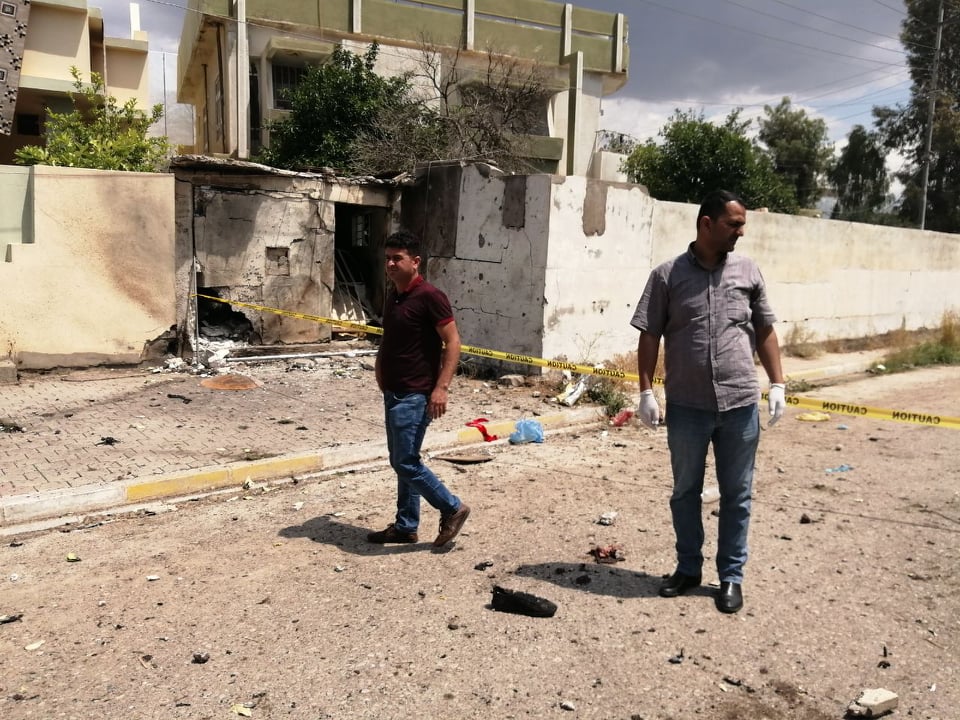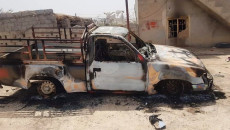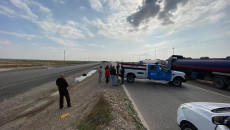Three Peshmerga (Kurdish fighters) were killed and another two were injured in an attack by so-called Islamic State ISIS militants in the sub-district of Altun Kopri (Pirdy), north west of Kirkuk on Saturday early in the morning, security officials said.
The clashes lasted for 40 minutes near the villages of Pirkan and the heights of Zurgarzrawi where Brigade 10 of Kurdish Peshmerga are based, adjacent to bases of Iraqi army.
Jamal Emenki, Pshemerga commander, said in a press conference “the Peshemrga firmly responded and defeated the attack. Three Peshmerga were martyred and two others were injured.” Senior officers reported among the casualties.
A statement by ministry of Peshmerga of Kurdistan Regional Government KRG, based in Erbil, said on Saturday a big number of Daesh terrorists were killed and their bodies left in the battlefield.
“We have several times warned of the threats posed by the terrorists in the areas with security gap. Unfortunately, the terrorists took the chance of gap between Peshmerga and Iraqi army, the statement added.
“We emphasize these areas need joint forces and cooperation.
Altun Kopri (The golden Bridge) is part of the oil rich-city of Kirkuk, home to about 1.2 million Kurds, Turkmen and Arabs, according to KRG figures in 2018. Kirkuk, located 238 kilometers north of Baghdad, is the center of the disputed territories where Iraqi security forces have taken control in October 2017 following the declaration of defeat of ISIS by Iraqi government.
The disputed territories extend from Khanaqin in the east on the border with Iran to the oil rich city of Kirkuk heading to the west of Mosul in Shingal, home to Ezidi ethno-religious minority, on the border with Syria.
Following the military defeat of ISIS, discord over security arrangements, public services, and the lack of a unified administration in the disputed territories, have plagued victims and survivors.
Currently, Kirkuk is under control of Baghdad with local police downtown while Iraqi army and pro-Shiite militia Popular Mobilization Forces PMF known as Hashid aal-Sha’abi deployed at the outskirts.
ISIS remnants are recently regrouping in the rural areas of the disputed territories and launching attacks against Iraqi army, the Peshmerga and the civilians in these regions.
On April 29th, a suicide bomber was killed in Kirkuk trying to enter national security service, another arrested. The hunt for the three others is ongoing, a commander of National security in Kirkuk told KirkukNow.
Nouri Hama Ali, commander of Peshmerga in West of Kirkuk sector, told the media of Kurdistan Democratic Party KDP, the clashed lasted for 40 minutes as Daesh militants stormed the Peshmerga from two sides, causing casualties in a battlefield.
Kurdistan Counter Terrorism Service CTS said in a statement on Saturday the situation is under control of the Peshmerga.

Kirkuk April 29, 2021- The site of shooting a suicide bomber targeted National security office. Photo by KirkukNow.
Senior officials of Kurdistan region called on Iraqi government and the US-led Coalition to deploy joint forces in the areas left deserted between Iraqi and Kurdish forces since October 2017, when Iraqi army retook control of the disputed territories run by the Kurds since fall of Saddam regime in 2003.
Iraqi Kurdistan Region President IKRP Nechirvan Barzani, said in a statement they have warned the Iraqi federal government and the international coalition of “the concerns over empowerment of Daesh and exploiting the security gap in the disputed territories.”
“We call on the Iraqi parliament, federal government and the international coalition to accelerate formation of joint forces of Peshemrga and Iraqi army in the disputed territories.”
Iraqi ministry of defense and Kurdish ministry of Peshmerga following months of meetings have failed to make a deal about six joint operation commands in Baghdad, Erbil, Kirkuk, Makhmour, Diyala and Mosul.
End of April, Kurdish minister of Peshmerga called on Iraqi minister to interfere and sort the joint operation command issue between Baghdad and Erbil.
The call followed the bombing the relatively stable town of Kifri, in the disputed territories on April 18, where a civilian was injured.

Khanaqin Diyalah, April 2021- Three vehicles set on fire by ISIS militants in a village northwest of Khanaqin in Diyala province. Photo exclusively for KirkukNow.
Following escalation of ISIS attacks in the disputed territories between Baghdad and Erbil leaving tens of casualties among Iraqi forces and civilians and causing damage to the houses and farms of the villagers, in retaliation a wide range of operations were launched by Iraqi troops in Khanaqin, Daquq and Duz Khurmatu disputed territories.
“From Khanaqin, on the border with Iran, up to west of Tigris, on the border with Syria, there is security vacuum between the Peshmerga and the army a reason for regrouping of Daesh militants and escalation in their attacks and moves,” commander Eminki said.
Lately several attacks by ISIS militants in Diyala, frequently at night, cause casualties and material losses.
Iraqi army, federal police, Popular Mobilization Forces PMF and local police compose Kirkuk Joint Operations Command and run the security of the province.
Following the fall of Saddam regime in 2003, article 140 of Iraqi constitution in 2005 was outlined as a framework for the determination of the fate of the disputed territories.
The three-stage process requires the normalization of the areas, conducting a census, and holding a referendum to know the will of the people to join Baghdad federal government or Iraq's Kurdistan region government KRG. Up today, part of the first stage has been implemented.






